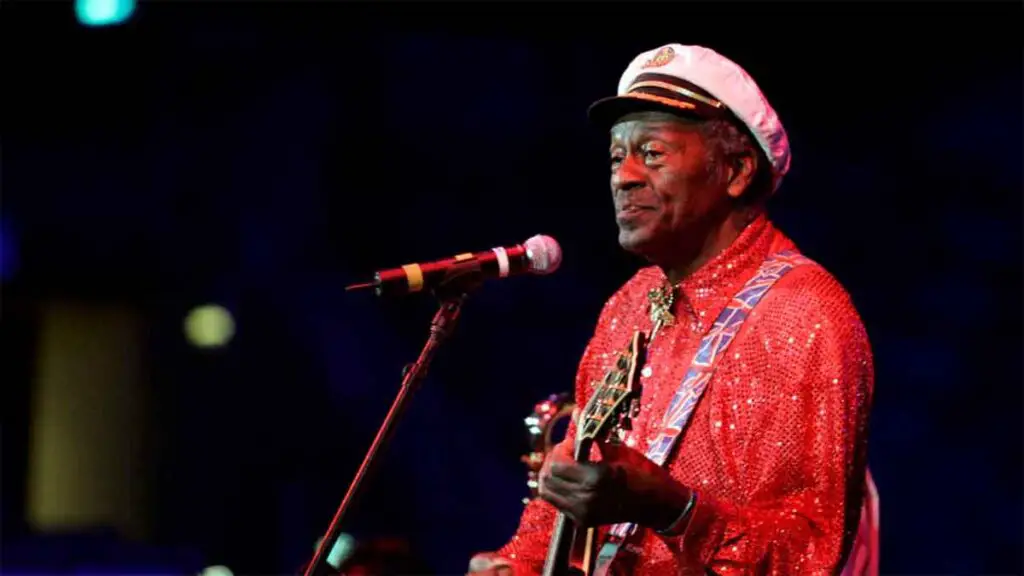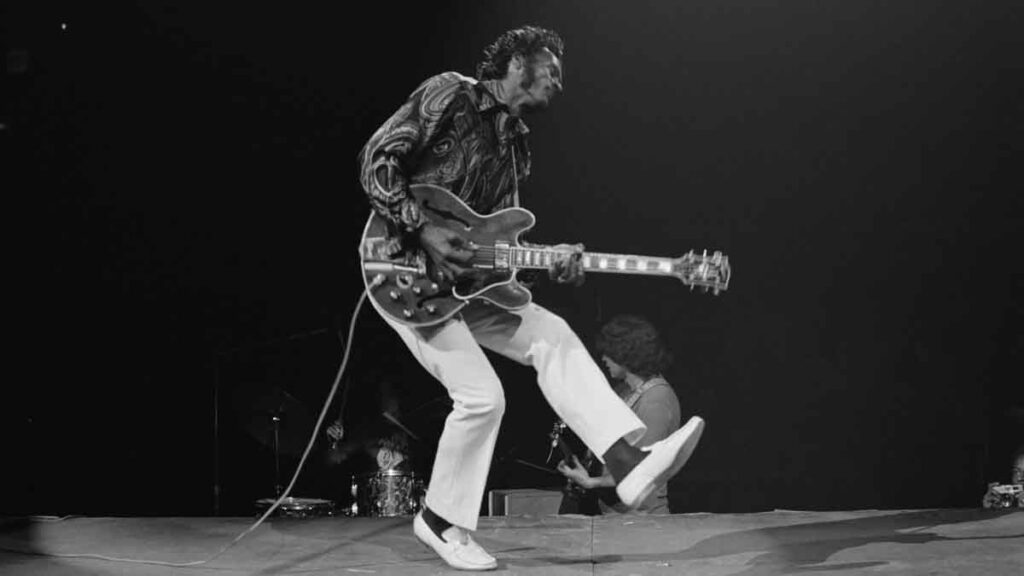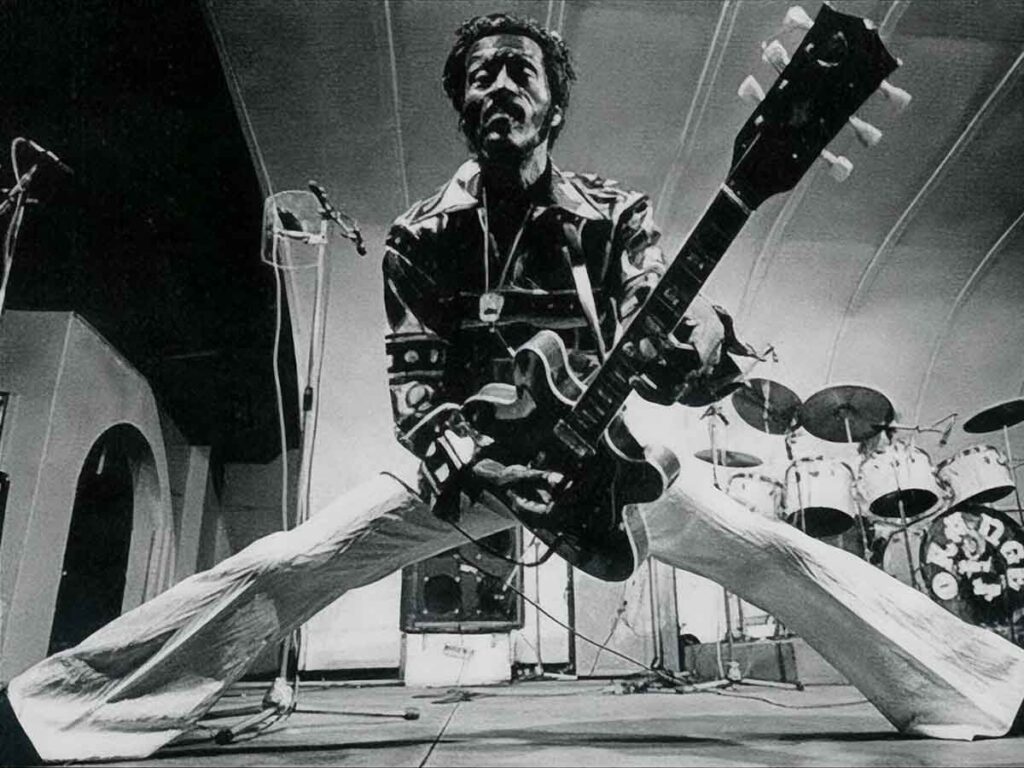Chuck Berry was the unstoppable force that took rock ‘n’ roll from back-alley clubs to the bright lights of center stage. His electrifying guitar licks, brilliant lyrics, and fearless moves paved the way for musicians everywhere, earning him the status of a legend in pop culture.
In 2001, Chuck Berry arrived at the New York State Fair in Syracuse with a wild plan, a rented Lincoln, and a briefcase ready to be stuffed with cash. He was there to replace Aretha Franklin, who had dropped out due to injured ribs, and Berry made sure he got paid upfront.
Local drummer Larry Luttinger recalled how Berry’s reputation for being stingy was definitely earned. The rock icon insisted on $20,000 in cash, counted out in $100 bills before he even considered walking onstage to belt out hits like “Johnny B. Goode” and “Maybellene.”
Once he took inventory of every single bill, Berry told a roadie to crank all the knobs on his amplifier to nine. With that, he launched into a show that had fans on their feet, proving that no matter what anybody said about him, the man could really play.
This “pay me first” attitude wasn’t just a one-time quirk—it was part of Berry’s lifelong business strategy. Stories from other musicians, like Daryl Hall, match up perfectly, describing how Berry simply refused to perform if he didn’t get cold, hard cash in his hand.
But Chuck Berry’s frugality definitely paid off, because despite what some rumors might suggest, he didn’t die broke. In fact, certain estimates hover around a whopping $50 million fortune, tied up in recording royalties, publishing rights, and possibly some real estate for good measure.

He learned early on what could happen if he didn’t watch out for his money. After signing his first deal with Chess Records, Berry admitted he had no idea that writing and recording songs meant separate income streams, so he quickly found ways to keep track of every penny.
Being this strict with income led some people to call him rude or difficult, and he didn’t exactly argue with that reputation. Some folks thought it was annoying when he demanded money in a brown paper bag or refused to play if the funds weren’t ready up front.
Berry did have a few problems during his life. He faced legal trouble when he was convicted of violating the Mann Act for transporting a minor across state lines and served time for tax evasion after failing to properly report his earnings, proving that his thrifty ways sometimes went too far.
Yet, Berry’s influence was so huge that even major stars like The Beatles, The Rolling Stones, and The Beach Boys covered his songs. Everyone from Paul McCartney to Mick Jagger recognized that without Berry’s funky riffs and snappy lyrics, rock ‘n’ roll as we know it simply wouldn’t exist.
He was also a pioneer in another way—often driving himself to gigs, guitar in the trunk, and using local backup bands to save on expenses. Because he rarely rehearsed with these pick-up musicians, the concerts could be chaotic, with Berry constantly adjusting tempos and leaving the band scrambling to keep up.
That same unpredictability was part of his charm, though. Audiences never knew what they’d get, but they usually received a thrilling performance capped off by Berry’s iconic duck walk across the stage, as if to say, “Top that, kids!”
Musically, his use of double-string guitar riffs made songs like “Johnny B. Goode” shoot to the top of classic rock playlists across the globe. He created that technique so he wouldn’t have to pay a second guitarist, which perfectly sums up Chuck Berry’s knack for blending genius with budget-mindedness.
Sure, Berry was tough, but he was also never dull, and his stubborn stance on money ultimately preserved his financial future while still allowing fans to hear his timeless tunes. He might have demanded cash before playing a single note, but once he got that money, you got a show that redefined rock ‘n’ roll.

Decades ago, Berry performed in legendary Syracuse shows alongside Buddy Holly, Fats Domino, and other rock pioneers. At one point, they all arrived on the same bus from Montreal, cutting through Rochester with guitars in hand, ready to bring electrifying music to the War Memorial.
Some fans first discovered his raw power in tracks like “Maybellene” or “School Days,” instantly hooked by Berry’s storytelling and rhythmic style. Others might have come across his famous stage moves, curious how a grown man could duck-walk like that without twisting an ankle.
No matter how people got introduced, they quickly realized why John Lennon said that if rock ‘n’ roll had another name, it would be Chuck Berry. His music spoke to teenagers everywhere about cars, romance, and wild fun, wrapping America’s youth culture in a catchy, guitar-driven package.
Even local talents who backed him up during unscripted sets recognized they were sharing the stage with a living legend, unpredictable though he was. Whether the show lasted 30 minutes or stretched into an hour, Berry gave audiences memories they cherished for years.
That’s the magic of Chuck Berry: a man who demanded to be paid before he played, yet always delivered something unforgettable once he struck those six strings. While his methods were sometimes wild, there’s no denying that he gave rock ‘n’ roll the beat that still echoes today.



